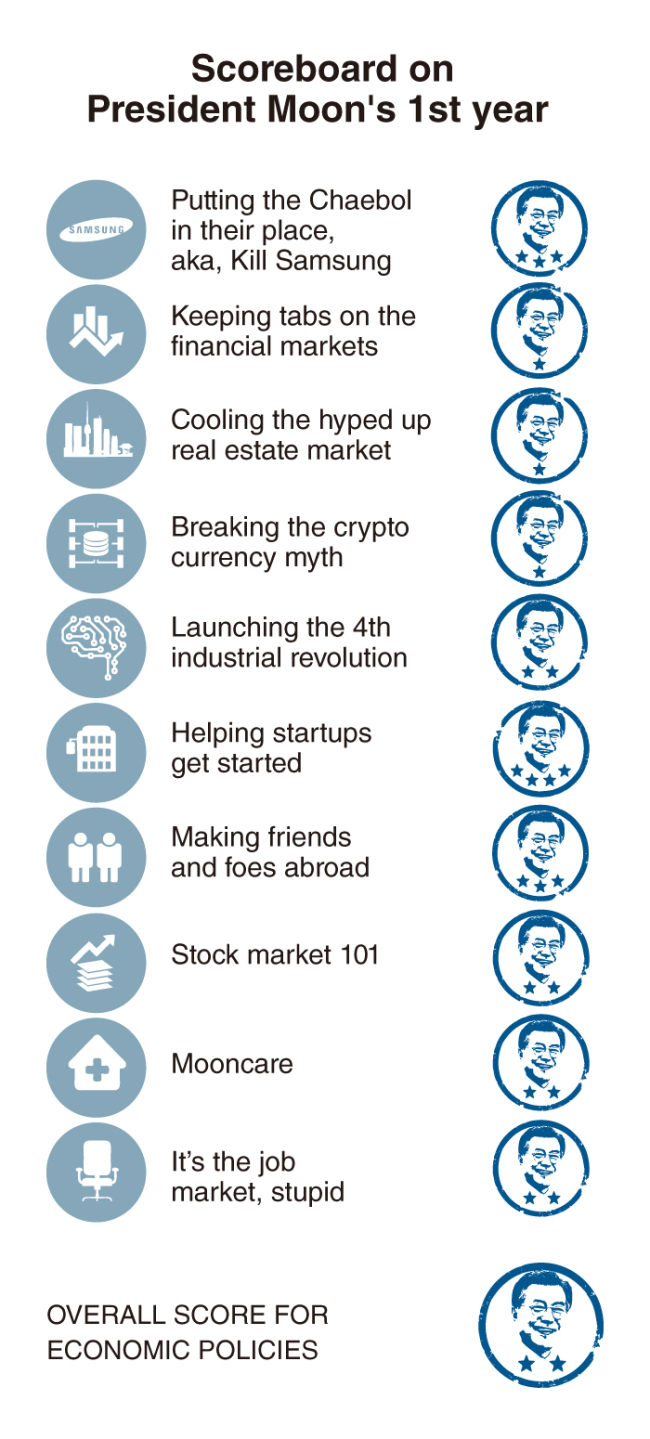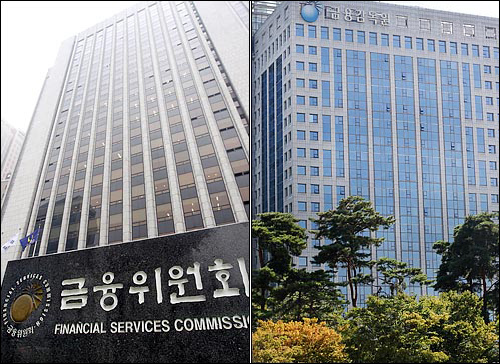Economy
[MOON’S 1ST YEAR] President gets 2 out of 5 stars on economic policies
[THE INVESTOR] After a year in office, President Moon Jae-in still enjoys an approval rate that would make any political leader jealous -- a whopping 80 percent. His popularity was boosted by the recent inter-Korean summit, but his following had been pretty solid to begin with, as it was backed by his open communication style and leadership. The economic scoreboard, however, was not all good news, and The Investor believes the government was only medicore in this area. Below shows where the Moon government should head to maintain its popularity.
 |
Hit the Chaebol on the nail
“Basically, there has been no chaebol reforms in the first year,” said Park Sang-in, a public administration professor at Seoul National University said on May 3 during a debate on Moon’s chaebol policy.
Park’s disappointment is partly due to the somewhat dashed hopes for Chaebol Sniper Kim Sang-jo -- head of the Fair Trade Commission, the country’s antitrust agency -- to eliminate unfair business practices for small and medium enterprises and to reduce cross-shareholdings at conglomerates.
 |
FTC Chairman Kim Sang-jo |
“Considering that the Federation of Korean Industries is almost dissolved, there have been some achievements,” Chung Mi-hwa, said lawyer and head of Citizens’ Coalition for Economic Justice, said.
But this might not be enough for chaebol reforms, mostly family-backed conglomerates which occupy a significant portion of the country’s economy, and President Moon might be running out of time.
While experts generally support the direction of chaebol reforms, they are concerned about the speed and want to send a stronger signal to conglomerates.
“The first six months could be considered as a warm-up but as it gets longer, I’m afraid it might be losing the momentum,” said Wi Pyoung-ryang, research fellow at Economic Reform Research Institute. “The time is indeed ripe for chaebol reforms: the citizens are aware of what is truly wrong in the wake of Choi Sun-sil scandal and the lost 10 years of the two previous administrations. Further, this administration is the most powerful in the reecent past.”
Park agreed. “The golden time for chaebol reforms is between now and the year-end. If we don’t fundamentally change in the next few years, our economy will be stuck,” he said.
Redoing the financial markets
To achieve chaebol reforms and shift to an innovation-driven economic growth, they should be accompanied by reforms in other sectors especially the financial sector, according to many experts including Park and Chung.
“Financial reforms are President Moon’s major policy but they lack a specific road map,” Kim Nam-geun, vice president of nongovernment organization Lawyers for a Democratic Society, said.
“Financial reforms begin with reforming financial authorities. Therefore, they need to be more specific and requires solid planning,” said Cho Nam-hee, head of Financial Consumer Agency, a nonprofit interest group representing consumers in the financial sector.
One big setback for President Moon was that he had to appoint three governors for the Financial Supervisory Service in nine months as two governors stepped down following allegations of impropriety. Kim Ki-sik, another chaebol sniper, stepped down in 15 days.
Frustrated by these repeated failures, experts are urging that financial reforms cannot be delayed and hopes that the new governor, Yoon Suk-heun, a 70-year old reform-driven professor, who was sworn in on May 8, could lead the much-delayed financial reforms.
 |
Korea's top financial authorities -- Financial Services Commission (left) and Financial Supervisory Service |
Trickle down effect: job creation
According to a survey by Citizens’ Coalition for Economic Justice on May 5, while his overall leadership and communication skills are getting a positive approval of about 75 percent, his employment policies and other economic policies got only 31 percent.
This is despite the government’s top priority being creating jobs. President Moon installed a job board in his office a year ago to monitor employment situation real time, making job creating a clear mandate for his administration. In addition to the job monitor, the Finance Ministry last year placed an 11.2 trillion won ($10 billion) supplementary budget to boost employment and support small and medium businesses.
The figures unfortunately do not match the financial and moral support from the government. The jobless rate stood at 4.5 percent in March, a 17-year high, while the youth unemployment level reached a dangerous level of 11.6 percent in the same month.
The government is saying that its focus has been changing the fundamentals of the job market and improving the quality of employment by taking several measures including increasing the minimum wage by 16.4 percent, shifting non-regular workers to regular employment and reducing working hours.
President Moon emphasized during the New Year speech that extraordinary approaches will be required over the next three to four years.
But experts point out that unless the local corporate sector sits up to take up a bigger role in creating more jobs, it will be impossible for the government to do it on its own.
By Park Ga-young (gypark@heraldcorp.com)








